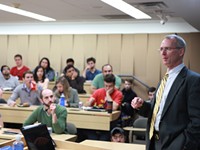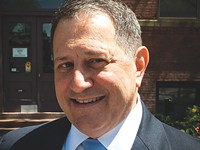[
{
"name": "500x250 Ad",
"insertPoint": "5",
"component": "15667920",
"parentWrapperClass": "",
"requiredCountToDisplay": "1"
}
]
Climate activists have been bruised and bloodied over the past few months. And yet there's a group in Rochester that still has hope that Congress will act to cut US carbon emissions.
The local chapter of Citizens' Climate Lobby has watched its numbers swell since President Donald Trump's election. It now gets around 40 people at its meetings, says chapter co-leader Sarah Mittiga.
"We've been exploding," Mittiga says. "We used to have 10 people at a meeting; 15 people would be like 'Oh! Big turnout!'"
And while the members have watched the White House assault on climate regulations, programs, and agreements – some long-standing, and some new – they've seen something encouraging. Citizens' Climate Lobby has two priorities: growing the size of the bipartisan Climate Solutions Caucus in the House and getting Congress to pass a carbon tax known as "carbon fee and dividend." And both are gaining support among Congressional Democrats and Republicans.
Under Citizens' Climate Lobby's plan, the federal government would slap a fee on any fossil fuel, whether it's extracted domestically or imported. The money from those fees would be refunded entirely to American households, with each getting an equal share of the proceeds. The carbon fee and dividend concept differs substantially from past cap and trade proposals, which were complex and would have directed revenues from emissions fees back into federal programs.
In Congress, the year-old Climate Solutions Caucus has grown to almost 50 members, with an even mix of Democrats and Republicans. And members of both parties are warming to carbon fee and dividend in a way that hasn't happened with past carbon pricing proposals.
The Citizens' Climate Lobby, which started in 2007, has earned a reputation for pragmatism and civility, which is helping it win over members of Congress. And right now, the local chapter really wants to win over Democratic Representative Louise Slaughter, who has so far resisted joining the Climate Solutions Caucus and backing carbon fee and dividend.
Climate Lobby members have enlisted Paetec founder and renewable-energy entrepreneur Arunas Chesonis in their cause. He recently wrote Slaughter encouraging her to support carbon fee and dividend, which he frames as an economically competitive approach to cutting carbon emissions. The group also convinced Rochester City Council to pass a resolution supporting carbon fee and dividend.
Slaughter has been through a few legislative battles over climate and energy policy, and she knows just how contentious the subjects can be. She's wary of both the carbon fee and dividend concept and the Climate Solutions Caucus.
Slaughter's a member of the all-Democratic Sustainable Energy and Environment Coalition, which supported the 2009 American Clean Energy and Security Act. That legislation was a comprehensive bill that boosted federal investment in renewable energy and laid out a cap and trade program to reduce greenhouse gas emissions and put a price on carbon. The bill passed the House with no Republican support and never received a vote in the Senate.
Slaughter still stands by the proposal. Revenue raised through any carbon pricing plan should be used progressively, she says, and should, in particular, be invested in renewables.
"I'm going to stick with what I've got," she said last week. "I'll be happy to look at the new bill if they file it, but I'm not holding my breath for them to file one."
She's also skeptical that any carbon tax proposal could succeed under the Trump White House and the current Republican controlled Congress.
But some GOP Congress members are open to the idea of carbon fee and dividend. Republican Tom Reed, whose district covers much of the Southern Tier and stretches into Ontario County, says Republicans saw cap and trade as a new tax accompanied by bureaucratic bloat.
"The dividend model is more attractive to an individual like me, because that makes sure that the money goes right back to the people as opposed to just feeding the beast of the federal spending," says Reed, who acknowledges the scientific consensus that human activity is causing climate change.
And, he says, details need to be "ferreted out" on carbon fee and dividend before he can "wholeheartedly support it."
Past carbon tax proposals have also been dogged by concerns that they might lead to higher energy prices, which could strain low- and moderate-income households. But a think tank's analysis of Citizen Climate Lobby's proposal says that 70 percent of households would break even if energy prices go up, says Rob Levine, a member of the Rochester Citizens' Climate Lobby chapter.
"If you really want this to work, citizens have to be OK," Levine says. "You can't raise prices on a vital product, being energy, and expect them to be OK with it if you don't help offset the costs."
The Climate Solutions Caucus was formed in 2016 by a pair of Florida House members, Republican Carlos Curbelo and Democrat Ted Deutch, who'd become increasingly concerned about the problems climate change was already causing in their state.
They saw an opportunity to bring members of their respective parties together to work on meaningful climate proposals. Citizens' Climate Lobby sees the same potential in the caucus and views it as a logical conduit for carbon fee and dividend legislation. That's why members of the local chapter are urging Slaughter to join it.
Some of the Democrats in the Sustainable Energy and Environment Coalition have already signed on, including Earl Blumenauer, an Oregon representative who started the Congressional Bike Caucus, and Jerry McNerney, a California representative who sponsored a carbon fee and dividend bill in 2015.
A few New York Republicans, including Reed, are also members. "I do recognize climate change," he says, "and I do recognize the need for prioritizing solutions to address climate change, as we're seeing the effects of it today. And the caucus, to me, was a natural fit to get like-minded members who want to spend a little extra time focusing on those solutions."
Reed's interest is largely in tax and trade policies. He is sponsor of legislation that would extend investment tax credits for renewable and alternative energy technologies; Slaughter is one of the bill's many cosponsors. Reed says he wants to work on other policies that would advance clean energy technologies and encourage energy-efficient buildings, in turn reducing domestic reliance on – and market demand for – fossil fuels.
But he's unlikely to join climate activism groups in their calls for an immediate halt in new fossil fuels development and infrastructure. He says a longer transition period will be necessary, since the US economy is based on fossil fuels.
"I think you still need to have reliable fossil fuel sources," he says, "but we can do that at the same time, in my opinion, we're incentivizing and promoting and supporting innovation as we go forward."
The caucus, in other words, isn't a panacea. But it may be, for now, the best chance for getting some serious climate legislation through Congress. And it may also be the most promising route for a long sought-after price on carbon emissions.
"There's a lot of good plans out there, but if they don't pass you're tilting at windmills," Levine says.
Speaking of...
-

Calendar preview: Getting schooled
Jun 9, 2020 -

Inglis makes conservative case for climate action
Apr 10, 2019 -

Morelle wins House primary
Jun 26, 2018 - More »
Latest in News
More by Jeremy Moule
-

ROCHESTER TEN
ANNETTE RAMOSAug 1, 2023 - More »






